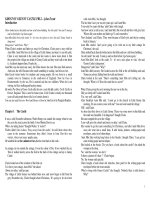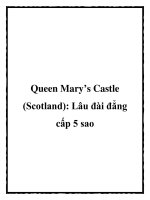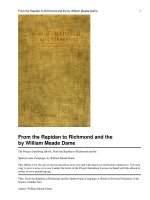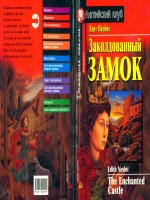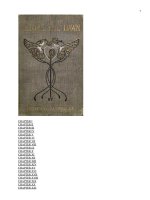Castle richmond
Bạn đang xem bản rút gọn của tài liệu. Xem và tải ngay bản đầy đủ của tài liệu tại đây (1.94 MB, 538 trang )
TheProjectGutenbergeBook,CastleRichmond,byAnthonyTrollope
ThiseBookisfortheuseofanyoneanywhereatnocostandwith
almostnorestrictionswhatsoever.Youmaycopyit,giveitawayor
re-useitunderthetermsoftheProjectGutenbergLicenseincluded
withthiseBookoronlineatwww.gutenberg.org
Title:CastleRichmond
Author:AnthonyTrollope
ReleaseDate:September18,2002[eBook#5897]
Mostrecentlyupdated:June19,2010
Language:English
Charactersetencoding:ISO-8859-1
***START OF THE PROJECT GUTENBERG EBOOK CASTLE
RICHMOND***
E-textpreparedbyCharlesAldarondo,CharlesFranks,
andthe
ProjectGutenbergOnlineDistributedProofreadingTeam
()
andrevisedby
RitaBaileyandJosephE.Loewenstein,M.D.
HTMLversionpreparedbyJosephE.Loewenstein,M.D.
CASTLERICHMOND
BY
ANTHONYTROLLOPE
WithanIntroductionby
AlgarThorold
London&NewYork:MCMVI
INTRODUCTION
"CastleRichmond"waswrittenin1861,longafterTrollopehadleftIreland.Thecharacterization
isweak,andtheplot,althoughtheauthorhimselfthoughtwellofit,mechanical.
The value of the story is rather documentary than literary. It contains several graphic scenes
descriptiveofthegreatIrishfamine.Trollopeobservedcarefully,andonthewholeimpartially,though
hispowersofdiscriminationwerenotquitefineenoughtomakehimanidealannalist.
Still,suchastheywere,hehasusedthemherewithnoinconsiderableeffect.Hisdesiretobefair
hasledhimtolaystressinaninverseratiotohisprepossessions,andhisPriestisabettermanthanhis
parson.
The best, indeed the only piece of real characterization in the book is the delineation of Abe
Mollett. This unscrupulous blackmailer is put before us with real art, with something of the loving
preoccupationofthehunterforhisquarry.Trollopelovedarogue,andinhislongportraitgallerythere
areseveralreallycharmingones.Hedidnot,indeed,perceivetheaestheticvalueofsin—hedidnot
perceivetheestheticvalueofanything,—andhisanalysisofhumannaturewasnotprofoundenoughto
reach the conception of sin, crime being to him the nadir of downward possibility—but he had a
professional,asortofhalfScotlandYard,halfmasterofhoundsinterestinacriminal."See,"hewould
muse, "how cunningly the creature works, now back to his earth, anon stealing an unsuspected run
acrosscountry,thecleverrascal;"andhisethicaldisapprovalever,asusual,withEnglishcriticsoflife,
in the foreground, clearly enhanced a primitive predatory instinct not obscurely akin, a cynic might
say,tothosedarkimpulsesheholdsuptoourreprobation.Thisself-realizationinhisfictionisoneof
Trollope'sprincipalcharms.Neverwasthereamoresubjectivewriter.UnlikeFlaubert,wholaiddown
thecanonthattheauthorshouldexistinhisworkasGodincreation,tobe,hereorthere,dimlydivined
butneverrecognized,thougheverywherelatent,Trollopewasneverwearyofwritinghimselflargein
everyman,woman,orchildhedescribed.
Theillusionofobjectivitywhichhesosuccessfullyachievesisduetothefactthathismindwasso
perfectlycontentedwithitshereditaryandcircumstantialconditions,wasitselfsoperfectlythemental
equivalentofthoseconditions.Thustheperfectionofhisegotism,tightasadrum,savedhim.Hadit
beenalittlelesscomplete,hewouldhavefalteredandbungled;asitwas,hehadthenaivecertaintyof
achild,towhoseinnocentapprehensiontheworldandselfareone,andwhothereforecannoterr.
ALGARTHOROLD.
CONTENTS.
I. THEBARONYOFDESMOND.
II. OWENFITZGERALD.
III. CLARADESMOND.
IV. THECOUNTESS.
V. THEFITZGERALDSOFCASTLERICHMOND.
VI. THEKANTURKHOTEL,SOUTHMAINSTREET,CORK.
VII. THEFAMINEYEAR.
VIII. GORTNACLOUGHANDBERRYHILL.
IX. FAMILYCOUNCILS.
X. THERECTOROFDRUMBARROWANDHISWIFE.
XI. SECONDLOVE.
XII. DOUBTS.
XIII. MR.MOLLETTRETURNSTOSOUTHMAINSTREET.
XIV. THEREJECTEDSUITOR.
XV. DIPLOMACY.
XVI. THEPATHBENEATHTHEELMS.
XVII. FATHERBARNEY.
XVIII. THERELIEFCOMMITTEE.
XIX. THEFRIENDOFTHEFAMILY.
XX. TWOWITNESSES.
XXI. FAIRARGUMENTS.
XXII. THETELLINGOFTHETALE.
XXIII. BEFOREBREAKFASTATHAPHOUSE.
XXIV. AFTERBREAKFASTATHAPHOUSE.
XXV. AMUDDYWALKONAWETMORNING.
XXVI. COMFORTLESS.
XXVII. COMFORTED.
XXVIII. FORA'THATANDA'THAT.
XXIX. ILLNEWSFLIESFAST.
XXX. PALLIDAMORS.
XXXI. THEFIRSTMONTH.
XXXII. PREPARATIONSFORGOING.
XXXIII. THELASTSTAGE.
XXXIV. FAREWELL.
XXXV. HERBERTFITZGERALDINLONDON.
XXXVI. HOWTHEEARLWASWON.
XXXVII. ATALEOFATURBOT.
XXXVIII. CONDEMNED.
XXXIX. FOX-HUNTINGINSPINNYLANE.
XL. THEFOXINHISEARTH.
XLI. THELOBBYOFTHEHOUSEOFCOMMONS.
XLII. ANOTHERJOURNEY.
XLIII. PLAYINGROUNDERS.
XLIV. CONCLUSION.
CHAPTERI.
THEBARONYOFDESMOND.
I wonder whether the novel-reading world—that part of it, at least, which
mayhonourmypages—willbeoffendedifIlaytheplotofthisstoryinIreland!
ThatthereisastrongfeelingagainstthingsIrishitisimpossibletodeny.Irish
servantsneednotapply;Irishacquaintancesaretreatedwithlimitedconfidence;
Irishcousinsareregardedasbeingdecidedlydangerous;andIrishstoriesarenot
popularwiththebooksellers.
For myself, I may say that if I ought to know anything about any place, I
ought to know something about Ireland; and I do strongly protest against the
injusticeoftheaboveconclusions.IrishcousinsIhavenone.Irishacquaintances
Ihavebydozens;andIrishfriends,also,bytwosandthrees,whomIcanlove
and cherish—almost as well, perhaps, as though they had been born in
Middlesex.IrishservantsIhavehadsomeinmyhouseforyears,andneverhad
onethatwasfaithless,dishonest,orintemperate.IhavetravelledalloverIreland,
closely as few other men can have done, and have never had my portmanteau
robbedormypocketpicked.AthotelsIhaveseldomlockedupmybelongings,
andmycarelessnesshasneverbeenpunished.Idoubtwhetherasmuchcanbe
saidforEnglishinns.
Irish novels were once popular enough. But there is a fashion in novels, as
thereisincoloursandpetticoats;andnowIfeartheyaredrugsinthemarket.It
is hard to say why a good story should not have a fair chance of success
whatevermaybeitsbent;whyitshouldnotbereckonedtobegoodbyitsown
intrinsic merits alone; but such is by no means the case. I was waiting once,
when I was young at the work, in the back parlour of an eminent publisher,
hoping to see his eminence on a small matter of business touching a threevolumed manuscript which I held in my hand. The eminent publisher, having
probably larger fish to fry, could not see me, but sent his clerk or foreman to
arrangethebusiness.
"Anovel,isit,sir?"saidtheforeman.
"Yes,"Ianswered;"anovel."
"It depends very much on the subject," said the foreman, with a thoughtful
andjudiciousfrown—"uponthename,sir,andthesubject;—dailylife,sir;that's
whatsuitsus;dailyEnglishlife.Nowyourhistoricalnovel,sir,isnotworththe
paperit'swrittenon."
IfearthatIrishcharacterisinthesedaysconsideredalmostasunattractiveas
historicalincident;but,nevertheless,Iwillmaketheattempt.Iamnowleaving
theGreenIsleandmyoldfriends,andwouldfainsayawordofthemasIdoso.
IfIdonotsaythatwordnowitwillneverbesaid.
Thereadabilityofastoryshoulddepend,onewouldsay,onitsintrinsicmerit
rather than on the site of its adventures. No one will think that Hampshire is
betterforsuchapurposethanCumberland,orEssexthanLeicestershire.What
abstractobjectioncantherethenbetothecountyCork?
Perhapsthemostinteresting,andcertainlythemostbeautifulpartofIreland
isthatwhichliesdownintheextremesouth-west,withfingersstretchingfarout
into the Atlantic Ocean. This consists of the counties Cork and Kerry, or a
portion,rather,ofthosecounties.ItcontainsKillarney,Glengarriffe,Bantry,and
Inchigeela;andiswateredbytheLee,theBlackwater,andtheFlesk.Iknownot
where is to be found a land more rich in all that constitutes the loveliness of
scenery.
Within this district, but hardly within that portion of it which is most
attractivetotourists,issituatedthehouseanddomainofCastleRichmond.The
river Blackwater rises in the county Kerry, and running from west to east
through the northern part of the county Cork, enters the county Waterford
beyond Fermoy. In its course it passes near the little town of Kanturk, and
through the town of Mallow: Castle Richmond stands close upon its banks,
within the barony of Desmond, and in that Kanturk region through which the
MallowandKillarneyrailwaynowpasses,butwhichsomethirteenyearssince
knewnothingofthenavvy'sspade,orevenoftheengineer'stheodolite.
CastleRichmondwasatthisperiodtheabodeofSirThomasFitzgerald,who
residedthere,everandalways,withhiswife,LadyFitzgerald,histwodaughters,
Mary and Emmeline Fitzgerald, and, as often as purposes of education and
pleasure suited, with his son Herbert Fitzgerald. Neither Sir Thomas nor Sir
Thomas'shousehadaboutthemanyofthoseinterestingpicturesquefaultswhich
aresogenerallyattributedtoIrishlandlordsandIrishcastles.Hewasnotoutof
elbows,norwasheanabsentee.CastleRichmondhadnoappearanceofhaving
beenthrownoutofitsownwindows.Itwasagood,substantial,modernfamily
residence,builtnotmorethanthirtyyearssincebythelatebaronet,withalawn
slopingdowntotheriver,withkitchengardensandwallsforfruit,withample
stables, and a clock over the entrance to the stable yard. It stood in a welltimbered park duly stocked with deer,—and with foxes also, which are
agriculturalanimalsmuchmorevaluableinanIrishcountythandeer.Sothatas
regards its appearance Castle Richmond might have been in Hampshire or
Essex; and as regards his property, Sir Thomas Fitzgerald might have been a
Leicestershirebaronet.
Here,atCastleRichmond,livedSirThomaswithhiswifeanddaughters;and
here,takingtheperiodofourstoryasbeingexactlythirteenyearssince,hisson
Herbertwasstayingalsointhosehardwintermonths;hisOxforddegreehaving
beentaken,andhisEnglishpursuitsadmittingofatemporarysojourninIreland.
ButSirThomasFitzgeraldwasnotthegreatmanofthatpartofthecountry—
atleast,notthegreatestman;norwasLadyFitzgeraldbyanymeansthegreatest
lady.Asthisgreatestlady,andthegreatestmanalso,will,withtheirbelongings,
be among the most prominent of our dramatis personæ, it may be well that I
shouldnotevensayawordofthem.
AlltheworldmusthaveheardofDesmondCourt.Itisthelargestinhabited
residence known in that part of the world, where rumours are afloat of how it
covers ten acres of ground; how in hewing the stones for it a whole mountain
was cut away; how it should have cost hundreds of thousands of pounds, only
that the money was never paid by the rapacious, wicked, bloodthirsty old earl
who caused it to be erected;—and how the cement was thickened with human
blood.SogoesrumourwiththemoreromanticoftheCeltictale-bearers.
It is a huge place—huge, ungainly, and uselessly extensive; built at a time
when, at any rate in Ireland, men considered neither beauty, aptitude, nor
economy.Itisthreestorieshigh,andstandsroundaquadrangle,inwhichthere
are two entrances opposite to each other. Nothing can be well uglier than that
greatpavedcourt,inwhichthereisnotaspotofanythinggreen,exceptwhere
the damp has produced an unwholesome growth upon the stones; nothing can
wellbemoredesolate.Andontheoutsideofthebuildingmattersarenotmuch
better.Therearenogardenscloseuptothehouse,noflower-bedsinthenooks
and corners, no sweet shrubs peeping in at the square windows. Gardens there
are,buttheyareaway,halfamileoff;andthegreathalldooropensoutupona
flat,bleakpark,withhardlyascraparounditwhichcourtesycancallalawn.
Here, at this period of ours, lived Clara, Countess of Desmond, widow of
Patrick, once Earl of Desmond, and father of Patrick, now Earl of Desmond.
TheseDesmondshadoncebeenmightymenintheircountry,rulingthepeople
around them as serfs, and ruling them with hot iron rods. But those days were
nowlonggone,andtraditiontoldlittleofthemthatwastrue.Howithadtruly
faredeitherwiththeearl,orwiththeirserfs,mendidnotwellknow;butstories
wereeverbeingtoldofwallsbuiltwithhumanblood,andofthedevilbearing
offuponhisshoulderacertainearlwhowasinanyotherwayquiteunbearable,
and depositing some small unburnt portion of his remains fathoms deep below
thesoilinanoldburying-groundnearKanturk.Andtherehadbeenagoodearl,
as is always the case with such families; but even his virtues, according to
tradition,hadbeenofauselessnamby-pambysort.Hehadwalkedtotheshrine
ofSt.Finbar,upinthelittleislandoftheGouganeBarra,withunboiledpeasin
his shoes; had forgiven his tenants five years' rent all round, and never drank
wineorwashedhimselfafterthedeathofhisladywife.
AtthepresentmomenttheDesmondswerenotsopotenteitherforgoodor
ill.ThelateearlhadchosentoliveinLondonallhislife,andhadsunkdownto
bethetoadyingfriend,orperhapsIshouldmoreproperlysaythebulliedflunky,
ofasensual,wine-bibbing,gluttonous—king.Lateinlife,whenhewasbroken
inmeansandcharacter,hehadmarried.Theladyofhischoicehadbeenchosen
asanheiress;buttherehadbeensomeslipbetweenthatcupoffortuneandhis
lip; and she, proud and beautiful, for such she had been—had neither relieved
norsoftenedthepovertyofherprofligateoldlord.
Shewasleftathisdeathwithtwochildren,ofwhomtheeldest,LadyClara
Desmond,willbetheheroineofthisstory.Theyoungest,Patrick,nowEarlof
Desmond,wastwoyearsyoungerthanhissister,andwillmakeouracquaintance
asaladfreshfromEton.
InthesedaysmoneywasnotplentifulwiththeDesmonds.Notbutthattheir
estates were as wide almost as their renown, and that the Desmonds were still
great people in the country's estimation. Desmond Court stood in a bleak,
unadornedregion,almostamongthemountains,halfwaybetweenKanturkand
Maccoom, and the family had some claim to possession of the land for miles
around. The earl of the day was still the head landlord of a huge district
extendingoverthewholebaronyofDesmond,andhalftheadjacentbaroniesof
Muskerry and Duhallow; but the head landlord's rent in many cases hardly
amountedtosixpenceanacre,andeventhosesixpencesdidnotalwaysfindtheir
wayintotheearl'spocket.Whenthelateearlhadattainedhissceptre,hemight
probably have been entitled to spend some ten thousand a year; but when he
died, and during the years just previous to that, he had hardly been entitled to
spendanything.
But,nevertheless,theDesmondsweregreatpeople,andownedagreatname.
Theyhadbeenkingsonceoverthosewildmountains;andwouldbestill,some
said,ifeveryonehadhisown.Theirgrandeurwasshownbytheprevalenceof
their name. The barony in which they lived was the barony of Desmond. The
river which gave water to their cattle was the river Desmond. The wretched,
ragged,poverty-strickenvillageneartheirowndismantledgatewasthetownof
Desmond. The earl was Earl of Desmond—not Earl Desmond, mark you; and
the family name was Desmond. The grandfather of the present earl, who had
repaired his fortune by selling himself at the time of the Union, had been
DesmondDesmond,EarlofDesmond.
Thelateearl,thefriendofthemostillustriouspersoninthekingdom,hadnot
been utterly able to rob his heir of everything, or he would undoubtedly have
doneso.Attheageoftwenty-onetheyoungearlwouldcomeintopossessionof
theproperty,damagedcertainly,asfarasanactivelyevilfathercoulddamageit
bylongleases,badmanagement,lackofoutlay,andrack-renting;—butstillinto
thepossessionofaconsiderableproperty.Inthemeantimeitdidnotfarevery
well, in a pecuniary way, with Clara, the widowed countess, or with the Lady
Clara,her daughter.Themeansatthewidow'sdisposalwereonlythosewhich
the family trustees would allow her as the earl's mother: on his coming of age
shewouldhavealmostnomeansofherown;andforherdaughternoprovision
whateverhadbeenmade.
As this first chapter is devoted wholly to the locale of my story, I will not
stoptosayawordastothepersonsorcharactersofeitherofthesetwoladies,
leaving them, as I did the Castle Richmond family, to come forth upon the
canvas as opportunity may offer. But there is another homestead in this same
baronyofDesmond,ofwhichandofitsowner—asbeingitsowner—Iwillsaya
word.
HapHousewasalsothepropertyofaFitzgerald.Ithadoriginallybeenbuilt
byanoldSirSimonFitzgerald,fortheuseandbehoofofasecondson,andthe
present owner of it was the grandson of that man for whom it had been built.
AndoldSirSimonhadgivenhisoffspringnotonlyahouse—hehadendowed
the house with a comfortable little slice of land, either cut from the large
patrimonialloaf,orelse,aswasmoreprobable,collectedtogetherandseparately
bakedforthisyoungerbranchofthefamily.Bethatasitmay,HapHousehadof
late years been always regarded as conferring some seven or eight hundred a
year upon its possessor, and when young Owen Fitzgerald succeeded to this
property, on the death of an uncle in the year 1843, he was regarded as a rich
mantothatextent.
Atthattimehewassometwenty-twoyearsofage,andhecamedownfrom
Dublin,wherehisfriendshadintendedthatheshouldpractiseasabarrister,to
set up for himself as a country gentleman. Hap House was distant from Castle
Richmondaboutfourmiles,standingalsoontheriverBlackwater,butnearerto
Mallow.Itwasapleasant,comfortableresidence,toolargenodoubtforsucha
property,asissooftenthecaseinIreland;surroundedbypleasantgroundsand
pleasantgardens,withagorsefoxcovertbelongingtotheplacewithinamileof
it,withaslatedlodge,andaprettydrivealongtheriver.Attheageoftwentytwo, Owen Fitzgerald came into all this; and as he at once resided upon the
place, he came in also for the good graces of all the mothers with unmarried
daughters in the county, and for the smiles also of many of the daughters
themselves.
SirThomasandLadyFitzgeraldwerenothisuncleandaunt,butnevertheless
theytookkindlytohim;—verykindlyatfirst,thoughthatkindnessafterawhile
becamelesswarm.Hewasthenearestrelationofthename;andshouldanything
happen—asthefataldeath-foretellingphrasegoes—toyoungHerbertFitzgerald,
hewouldbecometheheirofthefamilytitleandofthefamilyplace.
When I hear of a young man sitting down by himself as the master of a
household, without a wife, or even without a mother or sister to guide him, I
always anticipate danger. If he does not go astray in any other way, he will
probablymismanagehismoneymatters.Andthentherearesomanyotherways.
Ahouse,ifitbenotmadepleasantbydomesticpleasantthings,mustbemade
pleasant by pleasure. And a bachelor's pleasures in his own house are always
dangerous.Thereistoomuchwinedrunkathisdinnerparties.Hisguestssittoo
longovertheircards.Theservantsknowthattheywantamistress;and,inthe
absenceofthatmistress,thelanguageofthehouseholdbecomesloudandharsh
—and sometimes improper. Young men among us seldom go quite straight in
their course, unless they are, at any rate occasionally, brought under the
influenceofteaandsmalltalk.
There was no tea and small talk at Hap House, but there were huntingdinners.OwenFitzgeraldwassoonknownforhishorsesandhisriding.Helived
in the very centre of the Duhallow hunt; and before he had been six months
ownerofhispropertyhadbuiltadditionalstables,withhalfadozenlooseboxes
forhisfriends'nags.Hehadaneye,too,foraprettygirl—notalwaysintheway
that is approved of by mothers with marriageable daughters; but in the way of
whichtheysodecidedlydisapprove.
Andthusoldladiesbegantosaybadthings.Thosepleasanthunting-dinners
were spoken of as the Hap House orgies. It was declared that men slept there
halftheday,havingplayedcardsallthenight;anddreadfultalesweretold.Of
these tales one-half was doubtless false. But, alas, alas! what if one-half were
alsotrue?
Itisundoubtedlyaverydangerousthingforayoungmanoftwenty-twoto
keephousebyhimself,eitherintownorcountry.
CHAPTERII.
OWENFITZGERALD.
Ihavetiedmyselfdowntothirteenyearsagoasthetimeofmystory;butI
must go back a little beyond this for its first scenes, and work my way up as
quickly as may be to the period indicated. I have spoken of a winter in which
HerbertFitzgeraldwasathomeatCastleRichmond,havingthencompletedhis
Oxforddoings;butImustsaysomethingoftwoyearsprevioustothat,ofatime
when Herbert was not so well known in the county as was his cousin of Hap
House.
It was a thousand pities that a bad word should ever have been spoken of
OwenFitzgerald;tenthousandpitiesthatheshouldeverhavegivenoccasionfor
such bad word. He was a fine, high-spirited, handsome fellow, with a loving
heartwithinhisbreast,andbrightthoughtswithinhisbrain.Itwasutterlywrong
thatamanconstitutedashewasshouldcommencelifebylivingaloneinalarge
country-house.Butthosewhospokeillofhimshouldhaverememberedthatthis
washismisfortuneratherthanhisfault.Somegreaterendeavourmightperhaps
have been made to rescue him from evil ways. Very little such endeavour was
madeatall.SirThomasonceortwicespoketohim;butSirThomaswasnotan
energetic man; and as for Lady Fitzgerald, though she was in many things all
that was excellent, she was far too diffident to attempt the reformation of a
headstrongyoungman,whoafterallwasonlydistantlyconnectedwithher.
Andthustherewasnosuchattempt,andpoorOwenbecamethesubjectofill
report without any substantial effort having been made to save him. He was a
very handsome man—tall, being somewhat over six feet in height—athletic,
almostmorethaninproportion—withshort,lightchestnut-tintedhair,blueeyes,
andamouthperfectasthatofPhœbus.Hewasclever,too,thoughperhapsnot
educatedascarefullyasmighthavebeen:hisspeechwasusuallyrapid,hearty,
andshort,andnotseldomcausticandpointed.Hadhefallenamonggoodhands,
hemighthavedoneverywellintheworld'sfight;butwithsuchacharacter,and
lacking such advantages, it was quite as open to him to do ill. Alas! the latter
chanceseemedtohavefallentohim.
For the first year of his residence at Hap House, he was popular enough
amonghisneighbours.TheHapHouseorgieswerenotcommencedatonce,nor
whencommenceddidtheyimmediatelybecomeasubjectofscandal;andeven
duringthesecondyearhewastolerated;—toleratedbyall,andstillflatteredby
some.
Amongthedifferenthousesinthecountryatwhichhehadbecomeintimate
wasthatoftheCountessofDesmond.TheCountessofDesmonddidnotreceive
muchcompanyatDesmondCourt.Shehadnotthemeans,norperhapsthewill,
to fill the huge old house with parties of her Irish neighbours—for she herself
was English to the backbone. Ladies of course made morning calls, and
gentlementoo,occasionally;butsocietyatDesmondCourtwasforsomeyears
pretty much confined to this cold formal mode of visiting. Owen Fitzgerald,
however,didobtainadmittanceintotheprecinctsoftheDesmondbarracks.
He went there first with the young earl, who, then quite a boy, had had an
ugly tumble from his pony in the hunting-field. The countess had expressed
herself as very grateful for young Fitzgerald's care, and thus an intimacy had
sprung up. Owen had gone there once or twice to see the lad, and on those
occasions had dined there; and on one occasion, at the young earl's urgent
request,hadstayedandslept.
And then the good-natured people of Muskerry, Duhallow, and Desmond
began,ofcourse,tosaythatthewidowwasgoingtomarrytheyoungman.And
whynot?shewasstillabeautifulwoman;notyetfortybyagooddeal,saidthe
few who took her part; or at any rate, not much over, as was admitted by the
many who condemned her. We, who have been admitted to her secrets, know
thatshewasthenintruthonlythirty-eight.Shewasbeautiful,proud,andclever;
and if it would suit her to marry a handsome young fellow with a good house
and an unembarrassed income of eight hundred a year, why should she not do
so?Asforhim,woulditnotbeagreatthingforhimtohaveacountessforhis
wife,andanearlforhisstepson?
What ideas the countess had on this subject we will not just now trouble
ourselvestoinquire.ButastoyoungOwenFitzgerald,wemaydeclareatonce
thatnothoughtofsuchawretchedallianceeverenteredhishead.Hewassinful
in many things, and foolish in many things. But he had not that vile sin, that
unmanly folly, which would have made a marriage with a widowed countess
eligible in his eyes, merely because she was a countess, and not more than
fifteen years his senior. In a matter of love he would as soon have thought of
paying his devotions to his far-away cousin, old Miss Barbara Beamish, of
Ballyclahassan,ofwhomitwassaidthatshehadsethercapateveryunmarried
manthathadcomeintothewestridingofthecountyforthelastfortyyears.No;
itmayatanyratebesaidofOwenFitzgerald,thathewasnotthemantomake
uptoawidowedcountessforthesakeofthereflectedglitterwhichmightfallon
himfromhercoronet.
But the Countess of Desmond was not the only lady at Desmond Court. I
have before said that she had a daughter, the Lady Clara, the heroine of this
coming story; and it may be now right that I should attempt some short
descriptionofher;hervirtuesandfaults,hermeritsanddefects.Itshallbevery
short; for let an author describe as he will, he cannot by such course paint the
charactersofhispersonagesonthemindsofhisreaders.Itisbygradual,earnest
effortsthatthismustbedone—ifitbedone.Ten,nay,twentypagesofthefinest
descriptivewritingthateverfellfromthepenofanovelistwillnotdoit.
ClaraDesmond,whenyoungFitzgeraldfirstsawher,hadhardlyattainedthat
incipientstageofwomanhoodwhichjustifiesamotherintakingheroutintothe
gaietiesoftheworld.Shewasthenonlysixteen;andhadnotinhermannerand
appearancesomuchofthewomanasisthecasewithmanygirlsofthatage.She
wasshyanddiffidentinmanner,thinandtallinperson.IfIweretosaythatshe
was angular and bony, I should disgust my readers, who, disliking the term,
wouldnotstoptoconsiderhowmanysweetestgirlsareatthatagetrulysubject
tothoseepithets.Theirundevelopedbutactivelimbsarelongandfleshless,the
contour of their face is the same, their elbows and shoulders are pointed, their
feetandhandsseemtopossesslengthwithoutbreadth.Birthandbreedinghave
given them the frame of beauty, to which coming years will add the soft
roundnessofform,andtherichgloryofcolour.Theplump,rosygirloffourteen,
though she also is very sweet, never rises to such celestial power of feminine
graceasshewhoisangularandbony,whoselimbsarelong,andwhosejoints
aresharp.
SuchwasClaraDesmondatsixteen.Butstill,eventhen,tothosewhowere
giftedwiththepowerofseeing,shegavepromiseofgreatloveliness.Hereyes
were long and large, and wonderfully clear. There was a liquid depth in them
which enabled the gazer to look down into them as he would into the green,
pellucid transparency of still ocean water. And then they said so much—those
youngeyesofhers:fromhermouthinthoseearlyyearswordscamebutscantily,
but from her eyes questions rained quicker than any other eyes could answer
them.Questionsofwonderatwhattheworldcontained,—ofwonderastowhat
menthoughtanddid;questionsastotheinmostheart,andtruth,andpurposeof
thepersonquestioned.Andallthiswasaskedbyaglancenowandagain;bya
glanceofthoselong,shy,liquideyes,whichwereeverfallingonthefaceofhim
shequestioned,andtheneverasquicklyfallingfromit.
Her face, as I have said, was long and thin, but it was the longness and
thinness of growing youth. The natural lines of it were full of beauty, of pale
silentbeauty,tooproudinitselftoboastitselfmuchbeforetheworld,tomake
itselfcommonamongmany.Herhairwasalreadylongandrich,butwaslightin
colour,muchlighterthanitgrewtobewhensomefourorfivemoreyearshad
passedoverherhead.AtthetimeofwhichIspeaksheworeitinsimplebraids
brushedbackfromherforehead,nothavingasyetlearnedthatmajesticmodeof
sweepingitfromherfacewhichhasinsubsequentyearssogenerallyprevailed.
Andwhatthenofhervirtuesandherfaults—ofhermeritsanddefects?Will
it not be better to leave them all to time and the coming pages? That she was
proudofherbirth,proudofbeinganIrishDesmond,proudevenofherpoverty,
somuchImaysayofher,evenatthatearlyage.Inthatshewascarelessofthe
world'sesteem,fondtoafaultofromance,poeticinhertemperament,andtender
inherheart,shesharedtheordinary—shallIsayfoiblesorvirtues?—ofsomany
ofhersex.Shewaspassionatelyfondofherbrother,butnotnearlyequallysoof
hermother,ofwhomthebrotherwastooevidentlythefavouredchild.
She had lived much alone; alone, that is, with her governess and with
servantsatDesmondCourt.Notthatshehadbeenneglectedbyhermother,but
she had hardly found herself to be her mother's companion; and other
companions there she had had none. When she was sixteen her governess was
stillwithher;butayearlaterthanthatshewasleftquitealone,exceptinasmuch
asshewaswithhermother.
ShewassixteenwhenshefirstbegantoaskquestionsofOwenFitzgerald's
facewiththoselargeeyesofhers;andshesawmuchofhim,andheofher,for
thetwelvemonthsimmediatelyafterthat.Muchofhim,thatis,asmuchgoesin
thiscountryofours,wherefourorfiveinterviewsinasmanymonthsbetween
friendsissupposedtosignifythattheyareoftentogether.Butthismuch-seeing
occurred chiefly during the young earl's holidays. Now and again he did ride
overinthelongintervals,andwhenhediddosowasnotfrowneduponbythe
countess; and so, at the end of the winter holidays subsequent to that former
winterinwhichtheearlhadhadhistumble,peoplethroughthecountybeganto
saythatheandthecountesswereabouttobecomemanandwife.
Itwasjustthenthatpeopleinthecountywerealsobeginningtotalkofthe
HapHouseorgies;andthedoublescandalreachedOwen'sears,oneshortlyafter
the other. That orgies scandal did not hurt him much. It is, alas! too true that
consciousness of such a reputation does not often hurt a young man's feelings.
But the other rumour did wound him. What! he sell himself to a widowed
countess almost old enough to be his mother; or bestow himself rather,—for
whatwasthereinreturnthatcouldbereckonedasaprice?Atanyrate,hehad
givennoonecausetouttersuchfalsehood,suchcalumnyasthat.No;itcertainly
wasnotprobablethatheshouldmarrythecountess.
Butthissethimtoaskhimselfwhetheritmightormightnotbepossiblethat
heshouldmarrysomeoneelse.Mightitnotbewellforhimifhecouldfinda
younger bride at Desmond Court? Not for nothing had he ridden over there
throughthosebleakmountains;notfornothing,noryetsolelywiththeviewof
tyingfliesfortheyoungearl'ssummerfishing,orpreparingthenewnagforhis
winter'shunting.Thoselargebrighteyeshadaskedhimmanyquestions.Would
itnotbewellthatheshouldanswerthem?
For many months of that year Clara Desmond had hardly spoken to him.
Then,inthesummerevening,asheandherbrotherwouldliesprawlingtogether
on the banks of the little Desmond river, while the lad was talking of his fish,
and his school, and his cricket club, she would stand by and listen, and so
graduallyshelearnedtospeak.
Andthemotheralsowouldsometimesbethere;orelseshewouldwelcome
Fitzgerald in to tea, and let him stay there talking as though they were all at
home, till he would have to make a midnight ride of it before he reached Hap
House.Itseemedthatnofearastoherdaughterhadevercrossedthemother's
mind;thatnoideahadevercomeuponherthatherfavouredvisitormightlearn
tolovetheyounggirlwithwhomhewasallowedtoassociateonsointimatea
footing.OnceortwicehehadcaughthimselfcallingherClara,andhaddoneso
even before her mother; but no notice had been taken of it. In truth, Lady
Desmonddidnotknowherdaughter,forthemothertookherabsolutelytobea
child,wheninfactshewasachildnolonger.
"YoutakeClararoundbythebridge,"saidtheearltohisfriendoneAugust
evening,astheywerestandingtogetheronthebanksoftheriver,aboutaquarter
ofamiledistantfromthesombreoldpileinwhichthefamilylived."Youtake
Clararoundbythebridge,andIwillgetoverthestepping-stones."Andsothe
lad,withhisrodinhishand,begantodescendthesteepbank.
"Icangetoverthestepping-stones,too,Patrick,"saidshe.
"Canyouthough,mygayyoungwoman?You'llbeoveryouranklesifyou
do.Thatraindidn'tcomedownyesterdayfornothing."
Claraasshespokehadcomeuptothebank,andnowlookedwistfullydown
atthestepping-stones.Shehadcrossedthemscoresoftimes,sometimeswithher
brother,andoftenbyherself.Whywasitthatshewassoanxioustocrossthem
now?
"It'snouseyourtrying,"saidherbrother,whowasnowhalfacross,andwho
spokefromthemiddleoftheriver."Don'tyoulether,Owen.She'llslipin,and
thentherewillbenoendofarowupatthehouse."
"You had better come round by the bridge," said Fitzgerald. "It is not only
thatthestonesarenearlyunderwater,buttheyarewet,andyouwouldslip."
So cautioned, Lady Clara allowed herself to be persuaded, and turned
upwards along the river by a little path that led to a foot bridge. It was some
quarterofamilethither,anditwouldbethesamedistancedowntheriveragain
beforesheregainedherbrother.
"Ineedn'tbringyouwithme,youknow,"shesaidtoFitzgerald."Youcanget
overthestoneseasily,andIcangoverywellbymyself."
But it was not probable that he would let her do so. "Why should I not go
withyou?"hesaid."WhenIgetthereIhavenothingtodobutseehimfish.Only
ifweweretoleavehimbyhimselfhewouldnotbehappy."
"Oh,Mr.Fitzgerald,howverykindyouaretohim!Idosooftenthinkofit.
Howdullhisholidayswouldbeinthisplaceifitwerenotforyou!"
"Andwhatagodsendhisholidaysaretome!"saidOwen."Whentheycome
roundIcanrideoverhereandseehim,andyou—andyourmother.Doyouthink
thatIamnotdullalso,livingaloneatHapHouse,andthatthisisnotaninfinite
blessingtome?"
He had named them all—son, daughter, and mother; but there had been a
somethinginhisvoice,analmostinappreciablesomethinginhistone,whichhad
seemedtomarktoClara'shearingthatsheherselfwasnottheleastprizedofthe
threeattractions.Shehadfeltthisratherthanrealizedit,andthefeelingwasnot
unpleasant.
"Ionlyknowthatyouareverygoodnatured,"shecontinued,"andthatPatrick
isveryfondofyou.SometimesIthinkhealmosttakesyouforabrother."And
thenasuddenthoughtflashedacrosshermind,andshesaidhardlyawordmore
tohimthatevening.
This had been at the close of the summer holidays. After that he had been
onceortwiceatDesmondCourt,beforethereturnoftheboyfromEton;buton
theseoccasionshehadbeenmorewiththecountessthanwithherdaughter.On
the last of these visits, just before the holidays commenced, he had gone over
respecting a hunter he had bought for Lord Desmond, and on this occasion he
didnotevenseeClara.
Thecountess,whenshehadthankedhimforhistroubleinthematterofthe
purchase,hesitatedamoment,andthenwentontospeakofothermatters.
"Iunderstand,Mr.Fitzgerald,"saidshe,"thatyouhavebeenverygayatHap
Housesincethehuntingcommenced."
"Oh, I don't know," said Owen, half laughing and half blushing. "It's a
convenientplaceforsomeofthemen,andonemustbesociable."
"Sociable!yes,oneoughttobesociablecertainly.ButIamalwaysafraidof
thesociabilityofyoungmenwithoutladies.DonotbeangrywithmeifIventure
asafriendtoaskyounottobetoosociable."
"Iknowwhatyoumean,LadyDesmond.Peoplehavebeenaccusingusof—
ofbeingrakes.Isn'tthatit?"
"Yes,Mr.Fitzgerald,thatisit.ButthenIknowthatIhavenorighttospeak
toyouonsucha—suchasubject."
"Yes,yes;youhaveeveryright,"saidhe,warmly;"morerightthananyone
else."
"Oh,no;SirThomas,youknow—"
"Well, yes, Sir Thomas. Sir Thomas is very well, and so also is Lady
Fitzgerald; but I do not feel the same interest about them that I do about you.
Andtheyaresuchhumdrum,quiet-goingpeople.AsforHerbert,I'mafraidhe'll
turnoutaprig."
"Well,Mr.Fitzgerald,ifyougivemetherightIshalluseit."Andgettingup
from her chair, and coming to him where he stood, she looked kindly into his
face. It was a bonny, handsome face for a woman to gaze on, and there was
muchkindnessinhersasshesmiledonhim.Nay,therewasalmostmorethan
kindness, he thought, as he caught her eye. It was like,—almost like the
sweetnessofmotherlylove."AndIshallscoldyou,"shecontinued."Peoplesay
thatfortwoorthreenightsrunningmenhavebeenplayingcardsatHapHouse
tillmorning."
"Yes,Ihadsomementhereforaweek.Icouldnottaketheircandlesaway,
andputthemtobed;couldI,LadyDesmond?"
"And there were late suppers, and drinking of toasts, and headaches in the
morning, and breakfast at three o'clock, and gentlemen with very pale faces
whentheyappearedratherlateatthemeet—eh,Mr.Fitzgerald?"Andsheheld
uponefingerathim,assheupbraidedhimwithasmile.Thesmilewassosweet,
sounlikeherusuallook;that,totellthetruth,wasoftentoosadandcareworn
forherage.
"Suchthingsdohappen,LadyDesmond."
"Ah,yes;theydohappen.Andwithsuch aone as you, heavenknows I do
not begrudge the pleasure, if it were but now and then,—once again and then
donewith.Butyouaretoobrightandtoogoodforsuchthingstocontinue."And
shetookhishandandpressedit,asamotheroramother'sdearestfriendmight
havedone."Itwouldsogrievemetothinkthatyoushouldbeevenindangerof
shipwreck.
"Youwillnotbeangrywithmefortakingthisliberty?"shecontinued.
"Angry!howcouldanymanbeangryforsuchkindness?"
"And you will think of what I say. I would not have you unsociable, or
morose,orinhospitable;but—"
"Iunderstand,LadyDesmond;butwhenyoungmenaretogether,onecannot
alwayscontrolthem."
"Butyouwilltry.SaythatyouwilltrybecauseIhaveaskedyou."
Hepromisedthathewould,andthenwenthisway,proudinhisheartatthis
solicitude.Andhowcouldhenotbeproud?wasshenothighinrank,proudin
character, beautiful withal, and the mother of Clara Desmond? What sweeter
friend could a man have; what counsellor more potent to avert those dangers
whichnowhoveredroundhishead?
And as he rode home he was half in love with the countess. Where is the
youngmanwhohasnotinhisearlyyearsbeenhalfinlovewithsomewoman
older, much older than himself, who has half conquered his heart by her
solicitudeforhiswelfare?—withsomewomanwhohaswhisperedtohimwhile
othersweretalking,whohastoldhiminsuchgentle,lovingtonesofhisboyish
follies,whosetendernessandexperiencetogetherhaveeducatedhimandmade
him manly? Young men are so proud, proud in their inmost hearts, of such
tendernessandsolicitude,aslongasitremainssecretandwraptasitwereina
certain mystery. Such liaisons have the interests of intrigue, without—I was
goingtosaywithoutitsdangers.Alas!itmaybethatitisnotalwaysso.
OwenFitzgeraldasherodehomewashalfinlovewiththecountess.Notthat
hislovewasofakindwhichmadehiminanywaydesirousofmarryingher,or
ofkneelingatherfeetanddevotinghimselftoherforever;notthatitinanyway
interferedwiththeotherlovewhichhewasbeginningtofeelforherdaughter.
But he thought with pleasure of the tone of her voice, of the pressure of her
hand,ofthetendernesswhichhehadfoundinhereye.
It was after that time, as will be understood, that some goodnatured friend
hadtoldhimthathewasregardedinthecountyasthefuturehusbandofLady
Desmond.Atfirsthelaughedatthisasbeing—ashehimselfsaidtohimself—
toogoodajoke.Whenthereportfirstreachedhim,itseemedtobeajokewhich
he could share so pleasantly with the countess. For men of three and twenty,
though they are so fond of the society of women older than themselves,
understandsolittletheheartsandfeelingsofsuchwomen.Inhisideastherewas
an interval as of another generation between him and the countess. In her
thoughtstheintervalwasprobablymuchlessstriking.
Buttheaccusationwasmadetohimagainandagaintillitwoundedhim,and
hegaveupthatnotionofamutualjokewithhiskindfriendatDesmondCourt.It
did not occur to him that she could ever think of loving him as her lord and
master;butitwasbroughthometohimthatotherpeoplethoughtso.
A year had now passed by since those winter holidays in which Clara
Desmond had been sixteen, and during which she was described by epithets
which will not, I fear, have pleased my readers. Those epithets were now
somewhatlessdeserved,but still thenecessity of themhadnotentirelypassed
away. Her limbs were still thin and long, and her shoulders pointed; but the
growth of beauty had commenced, and in Owen's eyes she was already very
lovely.
AtChristmas-timeduringthatwinteraballwasgivenatCastleRichmond,to
celebratethecomingofageoftheyoungheir.Itwasnotaverygayaffair,forthe
Castle Richmond folk, even in those days, were not very gay people. Sir
Thomas, though only fifty, was an old man for his age; and Lady Fitzgerald,
thoughknownintimatelybythepoorallroundher,wasnotknownintimatelyby
anybutthepoor.MaryandEmmelineFitzgerald,withwhomweshallbecome
better acquainted as we advance in our story, were nice, good girls, and
handsomewithal;buttheyhadnotthatspecialgiftwhichenablessomegirlsto
makeapartyintheirownhousebrightinspiteofallobstacles.
Weshouldhavebutlittletodowiththisball,wereitnotthatClaraDesmond
washerefirstbroughtout,asthetermgoes.Itwasthefirstlargepartytowhich
shehadbeentaken,anditwastoheramatterofmuchwonderandinquirywith
thosewondering,speakingeyes.
AndOwenFitzgeraldwasthere;—asamatterofcourse,thereaderwillsay.
Bynomeansso.PrevioustothatballOwen'ssinshadbeencommenteduponat
Castle Richmond, and Sir Thomas had expostulated with him. These
expostulations had not been received quite so graciously as those of the
handsomecountess,andtherehadbeenangeratCastleRichmond.
Now there was living in the house of Castle Richmond one Miss Letty
Fitzgerald, a maiden sister of the baronet's, older than her brother by full ten
years.Inhercharactertherewasmoreofenergy,andalsomuchmoreofharsh
judgment, and of consequent ill-nature, than in that of her brother. When the
lettersofinvitationwerebeingsentoutbythetwogirls,shehadgivenadecided
opinionthatthereprobateshouldnotbeasked.Butthereprobate'scousins,with
thatpartialityforarakewhichissocommontoyoungladies,wouldnotabideby
theiraunt'scommand,andreferredthematterbothtomammaandpapa.Mamma
thoughtitveryhardthattheirowncousinshouldberefusedadmittancetotheir
house, and very dreadful that his sins should be considered to be of so deep a
dyeastorequiresosevereasentence;andthenpapa,muchbalancingthematter,
gavefinalordersthattheprodigalcousinshouldbeadmitted.
Hewasadmitted,anddangerouslyheusedtheprivilege.Thecountess,who
was there, stood up to dance twice, and twice only. She opened the ball with
youngHerbertFitzgeraldthe heir;andinaboutan hourafterwards she danced
againwithOwen.Hedidnotaskhertwice;butheaskedherdaughterthreeor
fourtimes,andthreeorfourtimesheaskedhersuccessfully.
"Clara,"whisperedthemothertoherchild,afterthelastoftheseoccasions,
givingsomelittlepullortwisttohergirl'sfrockasshedidso,"youhadbetter
notdancewithOwenFitzgeraldagainto-night.Peoplewillremarkaboutit."
"Will they?" said Clara, and immediately sat down, checked in her young
happiness.
Not many minutes afterwards, Owen came up to her again. "May we have
anotherwaltztogether,Iwonder?"hesaid.
"Not to-night, I think. I am rather tired already." And so she did not waltz
againalltheevening,forfearsheshouldoffendhim.
Butthecountess,thoughshehadthusinterdictedherdaughter'sdancingwith
themasterofHapHouse,hadnotdonesothroughanyabsolutefear.Toher,her
girlwasstillachild;achildwithoutawoman'sthoughts,oranyofawoman's
charms.AndthenitwassonaturalthatClarashouldliketodancewithalmost
theonlygentlemanwhowasnotabsolutelyastrangertoher.LadyDesmondhad
beenactuatedratherbyafeelingthatitwouldbewellthatClarashouldbeginto
knowotherpersons.
Bythatfeeling,—andperhapsunconsciouslybyanother,thatitwouldbewell
that Owen Fitzgerald should be relieved from his attendance on the child, and
enabled to give it to the mother. Whether Lady Desmond had at that time
realizedanyideasastoherowninterestinthisyoungman,itwasatanyratetrue
thatshelovedtohavehimnearher.Shehadrefusedtodanceasecondtimewith
HerbertFitzgerald;shehadrefusedtostandupwithanyotherpersonwhohad
askedher;butwithOwenshewouldeitherhavedancedagain,orhavekepthim
byherside,whilesheexplainedtohimwithflatteringfranknessthatshecould
notdosolestothersshouldbeoffended.
And Owen was with her frequently through the evening. She was taken to
andfromsupperbySirThomas,butanyothertakingsthatwereincurredwere
donebyhim.Heledherfromonedrawing-roomtoanother;hetookherempty
coffee-cup;hestoodbehindherchair,andtalkedtoher;andhebroughtherthe
scarf which she had left elsewhere; and finally, he put a shawl round her neck
while old Sir Thomas was waiting to hand her to her carriage. Reader, goodnatured, middle-aged reader, remember that she was only thirty-eight, and that
hithertoshehadknownnothingofthedelightsoflove.Bytheyoung,anysuch
hallucination on her part, at her years, will be regarded as lunacy, or at least
frenzy.
OwenFitzgeralddrovehomefromthatballinastateofmindthatwashardly
satisfactory. In the first place, Miss Letty had made a direct attack upon his
morals,whichhehadnotansweredinthemostcourteousmanner.
"Ihaveheardagreatdealofyourdoings,MasterOwen,"shesaidtohim."A
finehouseyou'rekeeping."
"Whydon'tyoucomeandjoinus,AuntLetty?"hereplied."Itwouldbejust
thethingforyou."
"Godforbid!"saidtheoldmaid,turninguphereyestoheaven.
"Oh,youmightdoworse,youknow.Withusyou'donlydrinkandplaycards,
and perhaps hear a little strong language now and again. But what's that to
slander,andcalumny,andbearingfalsewitnessagainstone'sneighbour?"andso
saying he ended that interview—not in a manner to ingratiate himself with his
relative,MissLettyFitzgerald.
After that, in the supper-room, more than one wag of a fellow had
